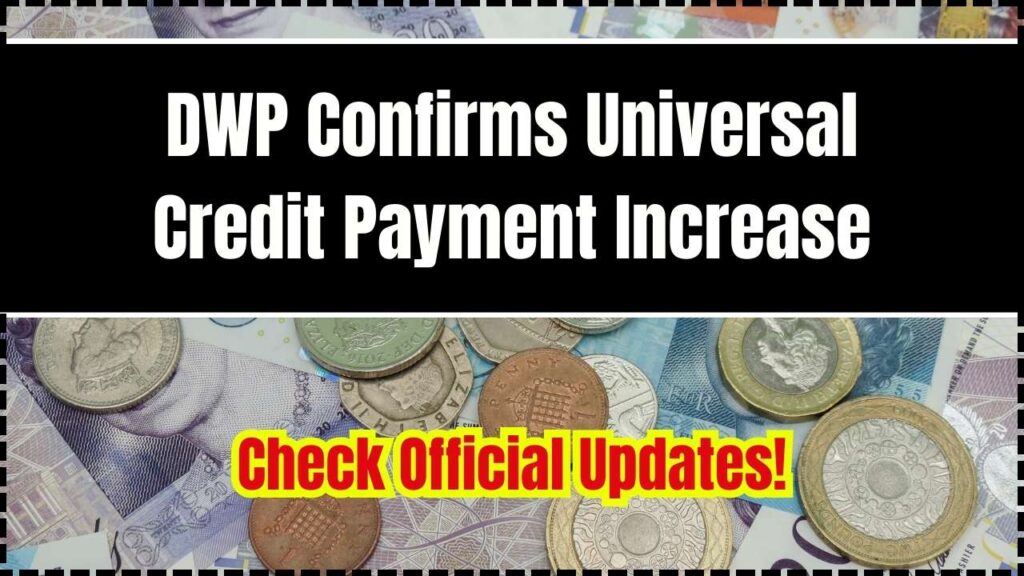DWP Confirms Universal Credit Payment Increase: The Department for Work and Pensions (DWP) has officially confirmed a Universal Credit payment increase for the 2025–2026 financial year, effective from April 7, 2025. This boost is tied to the 1.7% inflation rate recorded by the Consumer Price Index (CPI) in September 2024. For millions of households in the UK struggling with rising living costs, this updated payment offers timely support. Whether you’re a single parent, someone dealing with health issues, or simply looking to make ends meet, the increase brings practical relief and a sense of reassurance.
DWP Confirms Universal Credit Payment Increase
The 2025 Universal Credit increase might seem modest at 1.7%, but for many households, it’s a lifeline that helps make rent, food, and daily essentials just a bit more manageable. With smarter budgeting, lower debt deductions, and further improvements planned for 2026, there’s a light at the end of the tunnel for many struggling families and individuals across the UK. Staying informed and proactive is key—use calculators, check your journal, and reach out if something doesn’t look right. These payments aren’t just numbers—they’re about dignity, survival, and the right to live with stability.

| Change | Details | Effective Date |
|---|---|---|
| Standard Allowance Increase | 1.7% increase across all age groups | April 7, 2025 |
| Child Element Rates | First child: £339.00; Other children: £292.81 | April 7, 2025 |
| Carer Element | £201.68 per month | April 7, 2025 |
| Disability Support | LCW: £158.76; LCWRA: £423.27 | April 7, 2025 |
| Debt Deduction Cap | Reduced from 25% to 15% | April 30, 2025 |
Universal Credit Rate Breakdown for 2025–2026
Standard Monthly Allowances
| Claimant Type | 2024/25 Rate | 2025/26 Rate |
|---|---|---|
| Single under 25 | £311.68 | £316.98 |
| Single 25+ | £393.45 | £400.14 |
| Couple under 25 | £489.23 | £497.55 |
| Couple 25+ | £617.60 | £628.10 |
Additional Elements
| Element | 2024/25 Rate | 2025/26 Rate |
|---|---|---|
| First child (pre-April 2017) | £333.33 | £339.00 |
| Other children | £287.92 | £292.81 |
| Carer | £198.31 | £201.68 |
| LCW (Limited Capability for Work) | £156.11 | £158.76 |
| LCWRA (Limited Capability for Work & Related Activity) | £416.19 | £423.27 |
When Will the DWP Confirms Universal Credit Payment Increase Be Reflected?
Universal Credit payments are based on monthly assessment periods. That means you’ll see the increase from the first full period starting after April 7, 2025. Some folks may get it as early as May 13, while others could wait until mid-June.
Tip: You don’t need to apply for the increase. It’s applied automatically, but it’s a good idea to log into your Universal Credit account to double-check your updated payment breakdown.
Why Is This Increase Happening?
Each year, Universal Credit is reviewed in line with inflation, using the CPI figure from the previous September. This ensures the payment keeps pace—at least partially—with the rising cost of essentials like groceries, rent, and energy.
In 2025, the CPI was 1.7%, which directly influenced this year’s bump in benefits.
Expert View
According to the Institute for Fiscal Studies (IFS), “Inflation-linked increases are vital in maintaining the real value of benefits. But while this year’s uplift helps, it’s still not enough to close the gap caused by years of freezes and below-inflation rises.”
Real-Life Impact: Voices from the Ground
Lisa, a 34-year-old single mother from Manchester, shared:
“The few extra pounds a month might not sound like a lot, but for me, it covers the cost of school lunch for my son. That’s one less thing to stress over.”
Ahmed, a part-time worker receiving UC top-up, said:
“Even a small increase means I can afford bus fare to get to work without worrying if I’ll run short later in the week.”
Budgeting With Universal Credit: 4 Smart Tips
- Track every payment: Use your UC journal and a free app like Emma or Money Dashboard.
- Prioritize essentials: Rent, food, and utility bills should come first.
- Automate what you can: Set up direct debits for recurring bills.
- Seek help if needed: Use the Citizens Advice service for free budgeting support.
What’s the Fair Repayment Rate?
The Fair Repayment Rate, active from April 30, 2025, reduces how much can be deducted from your Universal Credit for things like advance loans, overpayments, or rent arrears.
Before: Max deduction was 25%
Now: Max deduction is 15%
This gives people more money in their pockets each month—on average, an extra £420 a year.
Future Changes: Looking Ahead to 2026
- April 2026: The standard allowance will go up by £7 a week for single claimants over 25. This is an above-inflation increase, part of a broader reform package.
- By 2029: The long-term effect of this increase will give claimants about £775 more than they would’ve received through inflation-only updates.
- Health-Related Cuts: Starting in 2026, new UC claimants under 22 won’t qualify for the same disability premiums, and some support will be reduced or frozen.
Comparing 2025 to Previous Years
| Year | CPI % | UC Increase % | Notes |
|---|---|---|---|
| 2023 | 10.1% | 10.1% | Major boost due to post-COVID inflation spike |
| 2024 | 6.7% | 6.7% | Continued inflation alignment |
| 2025 | 1.7% | 1.7% | Inflation stabilizes |
While this year’s increase is smaller, it’s still crucial in maintaining purchasing power.
Surprise £230 DWP Payment in May 2025 – State Pensioners Urged to Check Eligibility
State Pensioners: Check If You Could Get an Extra £150 from DWP Policy Update
Universal Credit Payment Dates Just Updated; Here’s How to Avoid Costly Delays
Frequently Asked Questions (FAQs)
Q1: Do I have to reapply to get the new rate?
No, the increase is applied automatically. Just check your UC journal for payment updates.
Q2: What if my payment hasn’t changed yet?
It depends on your assessment period. If your cycle starts on April 10, you won’t see the new rate until May 10 or later.
Q3: Does this increase apply to everyone on Universal Credit?
Yes, but the amount varies based on your age, living situation, children, and any additional elements like disability or carer support.
Q4: Can I still get advance payments or loans?
Yes, but they’ll be repaid over time. With the Fair Repayment Rate, repayments are now capped at 15% of your standard allowance.
Q5: What if I’m struggling even after the increase?
Reach out to Citizens Advice, StepChange, or your local Jobcentre. They can help you access emergency assistance or grants.






